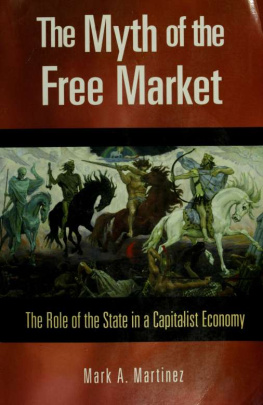The STATE of STATE
The STATE of STATE
Invisible Hands in
Politics and Civil Society
Nils Karlson
With a new preface by the author
First published 2002 by Transaction Publishers
Transaction edition published by arrangement with City University
Press, Stockholm, Sweden
Published 2017 by Routledge
2 Park Square, Milton Park, Abingdon, Oxon OX 14 4RN
711 Third Avenue, New York, NY 10017, USA
Routledge is an imprint of the Taylor & Francis Group, an informa business
New material this edition copyright 2002 by Taylor & Francis.
All rights reserved. No part of this book may be reprinted or reproduced or utilised in any form or by any electronic, mechanical, or other means, now known or hereafter invented, including photocopying and recording, or in any information storage or retrieval system, without permission in writing from the publishers.
Notice:
Product or corporate names may be trademarks or registered trademarks, and are used only for identification and explanation without intent to infringe.
Library of Congress Catalog Number: 00-062926
Library of Congress Cataloging-in-Publication Data
Karlson, Nils, 1958-
The state of state: invisible hands in politics and civil society / Nils Karlson with a new preface by the author,
p.cm.
Originally published: Uppsala: S. Academiae Ubsaliensis, 1993.
ISBN: 0-7658-0650-9 (pbk.: alk. paper)
1. State, The. 2. Civil society. 3. Political science. 4. Social structure. 5. Welfare state. I. Title.
JC336 .K36 2000
306.2dc21
00-062926
ISBN 13: 978-0-7658-0650-5 (pbk)
To Susanne
Acknowledgements
This thesis is the end-result of a long process, a process in which many colleagues and friends have participated and contributed to the final outcome. AU I can do is to thank all by naming a few.
First of all, I wish to thank my thesis supervisor Professor Leif Lewin for his continuous encouragement and support. My sincere gratitude also goes to Jrgen Hermansson, Barry Holmstrm and Anders Westholm who through their constructive ideas and criticism have made it possible for me to improve earlier versions of parts of the manuscript The seminars and stimulating intellectual climate at Skytteanum, the Department of Government at Uppsala University, have been invaluable for my work on this study.
The development of my basic ideas and models also benefited greatly from a period studying Economics at the George Mason University, VA, under the guidance of Professor James Buchanan, as did a short Nordic Summer Course on Theories of Justice at the University of Olso, taught by Professor Jon Elster.
Many other friends and colleagues have helped me in numerous ways. In particular, I wish to thank Stig-Bjrn Ljunggren for always keeping his spirits high while sharing the same office with me for several years.
I am also grateful for financial support from Torsten och Ragnar Sderbergs stiftelser, Stiftelsen Staten och Rtten, Stockholms nations jubelfeststipendium, Timbro Ids Capitoleum-stipendium, Borbos Hanssons fond, Stiftelsen Siamon and Jonas Nordenssons fond.
This book is dedicated to my beloved Susanne Enger, without whose support it would never have been completed.
Stockholm, April 1993
Nils Karlson
CONTENTS
PREFACE TO THE TRANSACTION EDITION
Since the first edition of this study was published six years ago, there has been an upsurge of interest in invisible-hand processes in politics and civil society. There are a number of reasons for this development.
First and foremost, the fall of the Soviet Union and the other communist states in Eastern Europe in the early 1990s finally made it clear to people, including most politicians and social scientists in the West, that planned or designed orders or societies do not work very well. In fact, they often have disastrous consequences. The visible hand is not as legitimate as it used to be. Thus, the welfare state and other centralized schemes have lost some of their appeal. Political parties from left to right have all increasingly come to favor invisible-hand processes and spontaneous orders such as markets and civil society. The New Labour Party in Britain is perhaps the most well-known example.
Secondly, scientists in political science as well as in economics also realized that it was necessary to broaden their perspectives to include the other spheres of society. They all became increasingly interested in the invisible hands of civil society, in particular the role of families, communities, and social norms for the overall functioning of society. Robert Putnams well-known study, Making Democracy Work: Civic Traditions in Modern Italy, can illustrate the trend among political scientists. My demand that we should start bringing civil society back in has thus, to a large degree, been fulfilled.
Thirdly, the world in the last five years has seen the emergence of a totally new, unpredicted and global example of the invisible hand, namely the Internet. It has emerged without anyone planning its occurrence and without anyone deliberately deciding to bring it about/The Internet is a typical, and fantastic, example of an unintended consequence of human action but not of human design. As with all such patterns, it remains to be seen when and if it should be considered a spontaneous order or disorder, i.e., when and if its consequences should be considered good or bad, beneficial or not. It is quite clear though, that if I was to write this book today, I would have integrated such an analysis. The developed concepts and theories are ready at hand.
Still, even though there has been a sharp increase in the interest in invisible-hand processes in politics and civil society in the last few years (an interest that has resulted in numerous important empirical findings) there is a need for an integrated, theoretical framework for the study of such processes. To my knowledge, this book is the only existing example of this. In particular, such an interdisciplinary, theoretical foundation is indispensable to really understand the interdependence of state, markets, and social norms. Fact without theory is always blind and, at best, only promotes an ad hoc understanding of the phenomenon in question.
My framework is particularly well suited to the explanation of the emergence of the welfare state. The two distinct invisible-hand processes, the logic of conceit and the logic of opportunism, that explain how the heavily politicized modern society came into existence cannot fully be grasped without a thorough knowledge of how the state influences, and in turn is influenced by, markets and communities. Without such an understanding, it is of course impossible to do anything about it.
Looking again at the real-world developments, the welfare states of the West have lately stopped to grow. In some countries, such as Great Britain and the Netherlands, the share of Gross Domestic Product (GDP) of the state has even decreased marginally. But not more than that. In most of these societies, the still dominating state sector provides monopoly services of diminishing quality to constant costs. Social norms are in decline, and the prosperity creating potential of markets is hampered. Consequently, the responsible politicians lose respect among the electorate.











